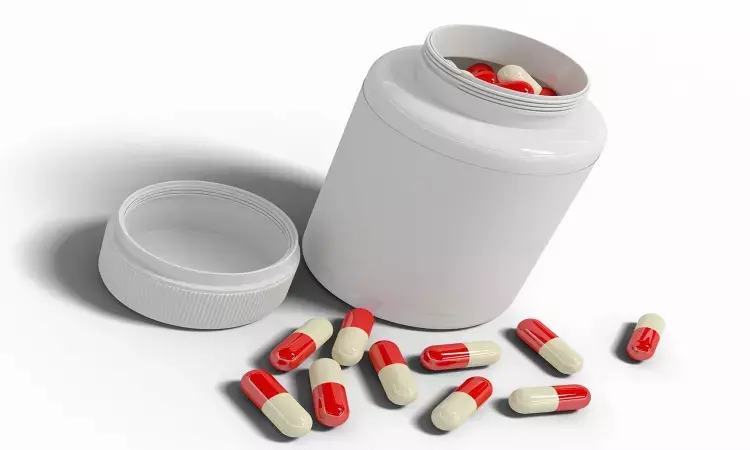- Home
- Medical news & Guidelines
- Anesthesiology
- Cardiology and CTVS
- Critical Care
- Dentistry
- Dermatology
- Diabetes and Endocrinology
- ENT
- Gastroenterology
- Medicine
- Nephrology
- Neurology
- Obstretics-Gynaecology
- Oncology
- Ophthalmology
- Orthopaedics
- Pediatrics-Neonatology
- Psychiatry
- Pulmonology
- Radiology
- Surgery
- Urology
- Laboratory Medicine
- Diet
- Nursing
- Paramedical
- Physiotherapy
- Health news
- Fact Check
- Bone Health Fact Check
- Brain Health Fact Check
- Cancer Related Fact Check
- Child Care Fact Check
- Dental and oral health fact check
- Diabetes and metabolic health fact check
- Diet and Nutrition Fact Check
- Eye and ENT Care Fact Check
- Fitness fact check
- Gut health fact check
- Heart health fact check
- Kidney health fact check
- Medical education fact check
- Men's health fact check
- Respiratory fact check
- Skin and hair care fact check
- Vaccine and Immunization fact check
- Women's health fact check
- AYUSH
- State News
- Andaman and Nicobar Islands
- Andhra Pradesh
- Arunachal Pradesh
- Assam
- Bihar
- Chandigarh
- Chattisgarh
- Dadra and Nagar Haveli
- Daman and Diu
- Delhi
- Goa
- Gujarat
- Haryana
- Himachal Pradesh
- Jammu & Kashmir
- Jharkhand
- Karnataka
- Kerala
- Ladakh
- Lakshadweep
- Madhya Pradesh
- Maharashtra
- Manipur
- Meghalaya
- Mizoram
- Nagaland
- Odisha
- Puducherry
- Punjab
- Rajasthan
- Sikkim
- Tamil Nadu
- Telangana
- Tripura
- Uttar Pradesh
- Uttrakhand
- West Bengal
- Medical Education
- Industry
New oral drug safe, effective treatment option for acromegaly patients

WASHINGTON--Researchers have found that an investigational oral form of the drug octreotide is an effective alternative to monthly injections of a drug called a somatostatin analog for patients of Acromegaly.
Acromegaly is a rare condition resulting from too much growth hormone, which causes large hands and feet, altered facial features and often heavy sweating, according to the Hormone Health Network. It also can lead to high blood pressure and diabetes. Usually, a noncancerous tumor in the pituitary gland causes acromegaly.
Adults who need medical maintenance treatment of the growth hormone disorder acromegaly respond well to an investigational oral form of the drug octreotide, investigators of the Chiasma OPTIMAL study reported. Results of the phase 3 randomized controlled clinical trial were accepted for presentation at ENDO 2020, the Endocrine Society's annual meeting, and will be published in the Journal of the Endocrine Society.
If surgical removal of the pituitary tumor does not cure the condition, one of the current treatments consists of monthly injections of a drug called a somatostatin analog, said OPTIMAL study principal investigator Susan Samson, M.D., Ph.D., medical director, Pituitary Center, Baylor St. Luke's Medical Center in Houston, Texas. She said these injections can be effective but have limitations, including suboptimal symptom control in some patients, pain at the injection site and lost workdays.
"The results of this study suggest that if oral octreotide capsules are approved by the Food and Drug Administration, this drug has the potential to expand the treatment options for adults with acromegaly beyond injectables," Samson said.
The drug manufacturer, Chiasma in Needham, Mass., reported that the FDA is considering its resubmitted new drug application for octreotide capsules, whose brand name would be MYCAPSSA. If accepted, octreotide capsules would become the first oral somatostatin analog for treatment of acromegaly in adults, according to Chiasma, which funded the OPTIMAL (Octreotide capsules vs. Placebo Treatment In MultinationAL centers) study.
Fifty-six adults with active acromegaly participated in the nine-month study, with 28 patients each randomly assigned to receive either octreotide capsules or placebo (inactive) capsules. Neither the patients nor the investigators knew which treatment they were receiving, and all patients stopped their injections one month before the study.
Excess growth hormone raises levels of IGF-1, a hormone that reflects growth hormone activity better than measuring growth hormone, Samson said. Therefore, the study defined successful maintenance of response to octreotide capsules as blood values of insulin-like growth factor-1 (IGF-1) being within the upper limit of normal when averaged at 34 and 36 weeks of treatment. Average IGF-1 levels in patients receiving octreotide capsules were in the normal range at the end of treatment but exceeded normal limits in patients receiving placebo, Samson reported.
"Octreotide capsules appeared safe and well-tolerated," she said, adding that 90 percent of patients completing oral octreotide therapy chose to continue treatment in a long-term extension study.
Hina Zahid Joined Medical Dialogue in 2017 with a passion to work as a Reporter. She coordinates with various national and international journals and association and covers all the stories related to Medical guidelines, Medical Journals, rare medical surgeries as well as all the updates in the medical field. Email: editorial@medicaldialogues.in. Contact no. 011-43720751
Dr Kamal Kant Kohli-MBBS, DTCD- a chest specialist with more than 30 years of practice and a flair for writing clinical articles, Dr Kamal Kant Kohli joined Medical Dialogues as a Chief Editor of Medical News. Besides writing articles, as an editor, he proofreads and verifies all the medical content published on Medical Dialogues including those coming from journals, studies,medical conferences,guidelines etc. Email: drkohli@medicaldialogues.in. Contact no. 011-43720751


